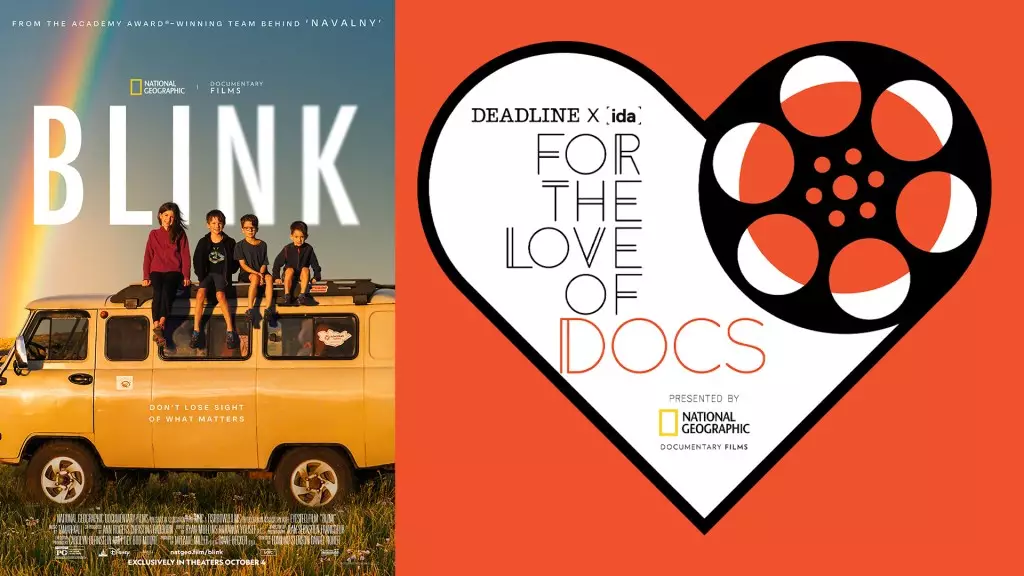Édith Lemay and Sébastien Pelletier, hailing from Montreal, are not your conventional travelers. Their relentless pursuit of global exploration goes beyond mere wanderlust; it embodies a poignant purpose. Discovering that three of their four children might eventually lose their sight due to retinitis pigmentosa ignited a passionate quest in the family. Édith and Sébastien embarked on an ambitious journey designed to ensure their children—Mia (11), Léo (9), Colin (6), and Laurent (4)—could savor vibrant visual moments, creating a bank of memories that transcends their potential future blindness.
The family’s adventure is captured in the National Geographic documentary “Blink,” directed by Edmund Stenson and Daniel Roher. This film aims to showcase the emotional depth of their travels while preserving the essence of childhood wonder. Through this lens, Stenson explains the importance of allowing the children to shape their travel experiences. By prioritizing their perspectives, the documentary is more than just a collection of places visited—it becomes a heartfelt narrative that offers insight into how families confront adversity together.
One of the most unique aspects of this journey is the empowerment given to the children in deciding the course and nature of their travels. In an era where parents often dictate their children’s experiences—sometimes shrouded in fear and overprotection—Lemay and Pelletier took a refreshing approach. They invited Mia, Léo, Colin, and Laurent to create their own “bucket list,” fulfilling their curiosity in a world teeming with sights to behold.
Édith recalls a moment of pure spontaneity when Léo suggested visiting Japan to engage with Pokémon culture. Their response was an enthusiastic “yes,” reflecting an openness to adventure and a break from traditional parental roles. This approach not only cultivated cherished memories but also imbued the children with a sense of agency and confidence in their decision-making. Activities were varied—from enjoying fruit juice on a camel in the Gobi Desert to the joy of discovering new cultures—that markedly enriched the children’s perception of the world, establishing a wealth of visual memories to cherish.
The process behind “Blink” reveals a collaborative spirit that underscores the connection between storytelling and real-life experiences. Daniel Roher, the Oscar-winning filmmaker known for “Navalny,” had to balance several personal commitments during the filming period. Therefore, he entrusted the directorial helm to his long-time collaborator Edmund Stenson. This decision underscored a deep brotherly bond built over years of collaboration, emphasizing the importance of trust in creative projects.
Stenson described the experience of capturing the family’s journey as akin to allowing the children to drive the narrative. By focusing on how children interpret and explore the world—often outside conventional storytelling frameworks—”Blink” harnesses the unpredictable nature of youth. Children possess an innate ability to create magic from mundane moments, a quality Stenson sought to encapsulate. The choice to film from a lower angle allows viewers to immerse themselves in a child’s perspective, providing a refreshing take on what might otherwise seem like standard narratives about family travels.
This family’s unique approach to parenting resonates deeply with contemporary discussions about child-rearing styles. Roher, reflecting on his relationship as a parent, admires how Édith and Sébastien allow their children to thrive independently, shielding them from the all-consuming tendencies of helicopter parenting. This modern trend, where parents often hover, can stifle resilience and critical thinking in children.
Through faith in their children’s capabilities, the Lemay-Pelletier family embodies a model of trust that allows kids to navigate their explorative impulses. As Stenson articulates, this “disruptive quality” of children—inherent to their natural explorations—paves the way for authentic, lived experiences that feel enriching rather than constrictive.
“Blink” is poised to premiere on National Geographic on December 16, soon followed by its release on Disney+ and Hulu. The film not only captures breathtaking landscapes and adventurous exploits but also serves as a profound reminder of the beauty that exists within adversity. For Édith and Sébastien, their journey is far from just a travel diary; it is an expedition woven with love, courage, and the indelible desire to combat the darkness of impending sight loss with rich, vibrant memories that can last a lifetime. In a world often dominated by uncertainty, the Lemay-Pelletier family’s story stands as a testament to hope, resilience, and the power of experiential learning.

